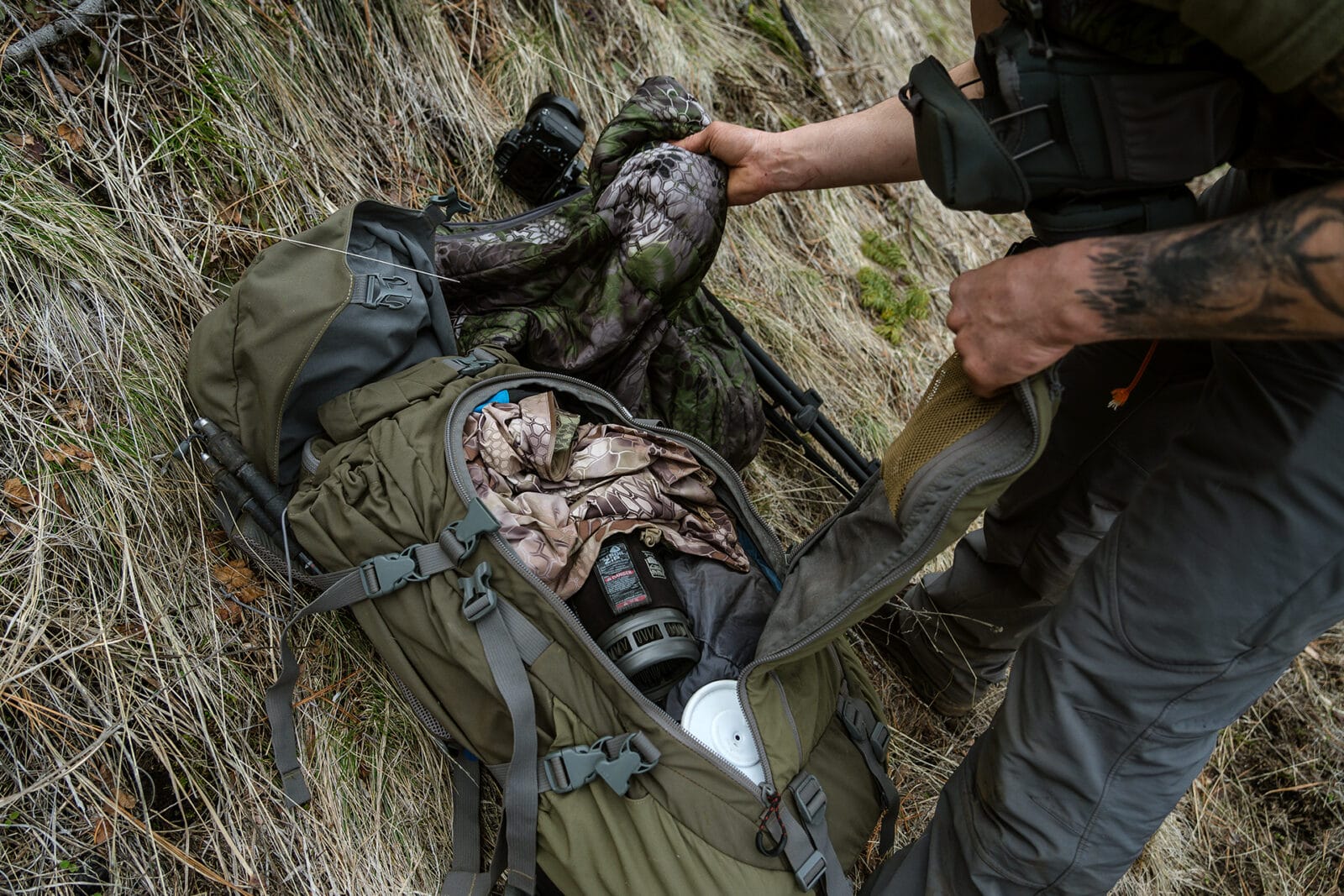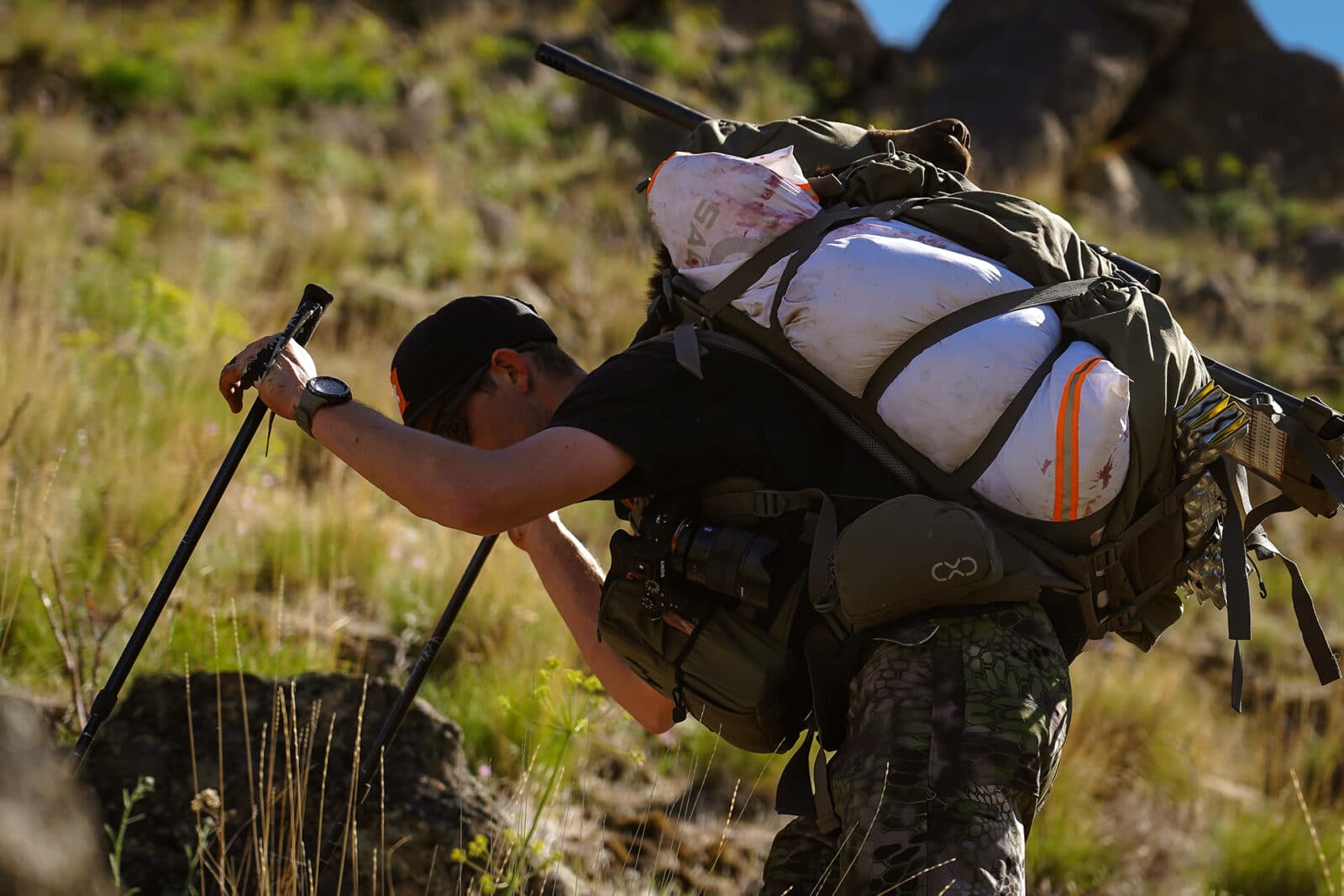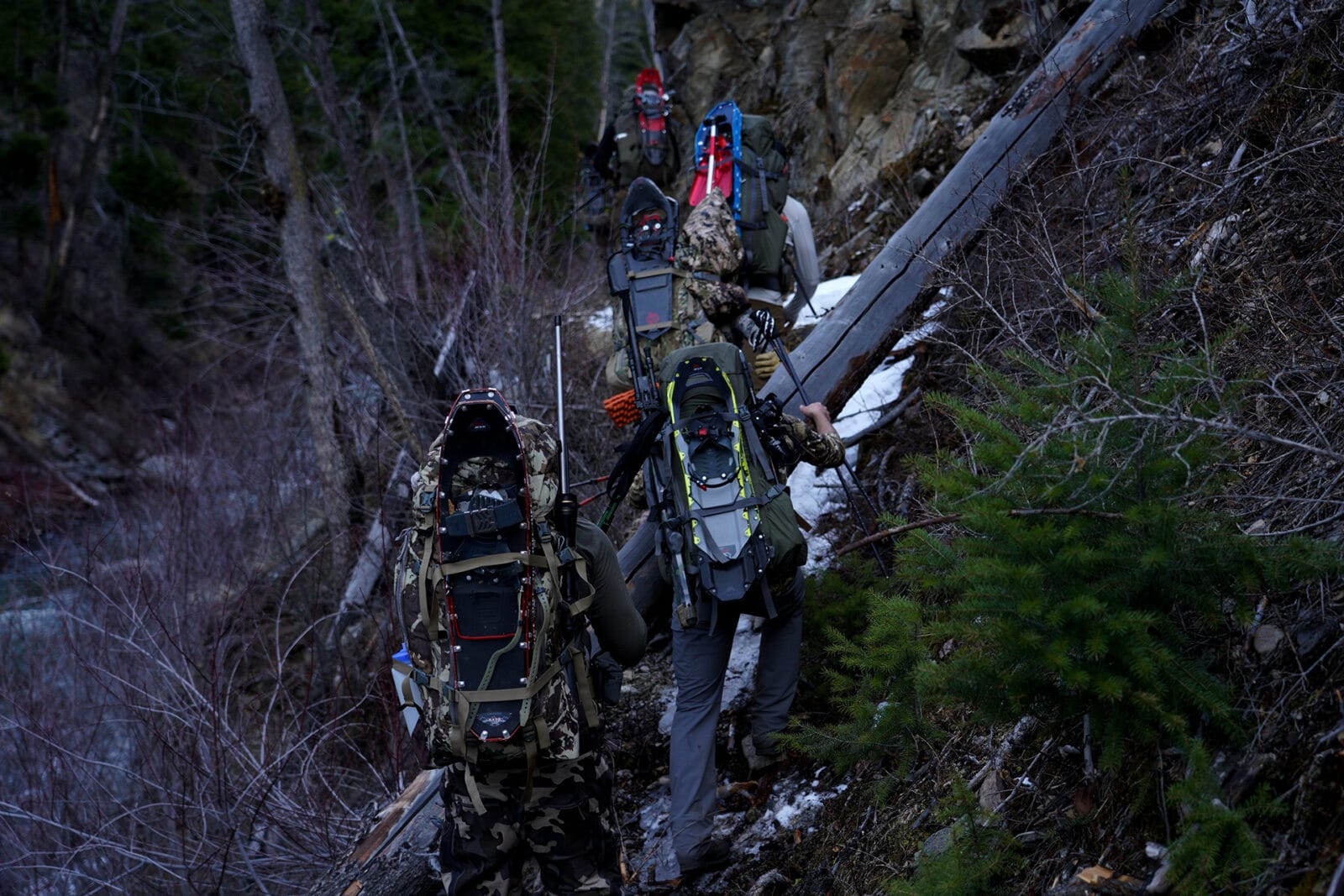Choosing the right hunting backpack for your needs is tough, and ensuring that you’re getting the most out of your pack comes down to trial and error and a few basic truths borne from experience.
To help shorten your learning curve and get you a little closer to becoming a confident backcountry hunter, we sat down with Exo Mtn Gear’s Mark Huelsing, host of The Hunt Backcountry Podcast, to discuss how to choose a new hunting backpack based on needs and fit, how to pack your bag to get you closer to achieving your objectives while maintaining comfort, and how Exo’s design philosophy and annual Death Hike inform the products you see on the shelf.
Choosing the Right Hunting Pack Size
At first glance, choosing the right size pack seems simple enough—get a big one just in case, right? According to Exo’s Mark Huelsing, it isn’t quite that easy.
“We always suggest that a hunter gets the pack that is capable of offering the space needed for their longest trips knowing full well that the larger bag can still be compressed quickly and cleanly for shorter trips. That said, we advise that you do not select a bag bigger than you truly need. Most hunters will tend to fill all the space they have available, which means they often carry more than they need.”
While there is no hard-and-fast rule to determine the size you need, a starting point can be determined by assuming that you’ll need approximately 1,000 cubic inches per day. Of course, this guideline should be altered based on your specific needs—an ultralight hunter will need significantly less space than someone who likes a cushier camp.

So choosing the right pack boils down to realistically assessing your needs, carefully considering what you want to accomplish, and determining what pack size helps you meet your objectives. There’s obviously no one-size-fits-all solution, so check out all the options, talk to folks in the know, and snag the pack that works best for you.
The Importance of Fit
“Most of us have had bad experiences carrying packs that hurt our back, put pressure on our shoulders, caused pressure points, or created instability that made it feel like the weight was ‘pulling’ at our body,” says Mark. “Those negative experiences are the result of a pack that simply did not fit you well.”
To get an idea of how a properly fitted pack looks, check out this series of before-and-after photos from Exo. Do any of the before photos look familiar? Quite simply, even the best pack for the job is going to slow you down and wear you out if it doesn’t fit.
While your best option for fitting a pack is always going to be a one-on-one session with an expert, other options exist. Exo’s collection of how-to videos will give you the information you need to dial in your fit, so your first step should be watching a few YouTube videos and making your initial adjustments. Then, it’s time to load up your pack as if you’re heading out on a hunt. Put in a couple of miles, then ask yourself a few questions. Do you notice any pressure spots? Areas where your pack rubs or chafes? Are you feeling more sore in certain areas than you should be? Make the final adjustments, then monitor your body and how you feel to ensure that when you’re in the field, your mind is on the hunt and not on your pack.
How Should I Pack My Hunting Pack?
Mountains of information on how to pack your hunting backpack are available, but the strategy can be distilled down to a few basic tenets. “To simplify the science,” Mark notes, “let’s just say that the further a weight is away from your body, the heavier that weight will actually feel. The weight didn’t change, but the perceived effort to carry and stabilize that weight did change.” The heaviest items you carry, then, should be placed close to your body and supported on the middle or upper section of your back.

Further considerations must be made for how the contents of your pack will change when you’re standing over a pile of meat that needs to be moved. Packs such as Exo’s are designed with an integrated load-shelf. This unique load-bearing system allows you to carry heavy loads of meat between the bag and the frame, keeping the densest weight on your back as close to your body as possible to lessen your perceived load.
Finally, consider how frequently you’ll use the items you’ve decided to bring. It doesn’t make sense to dig through rarely used items to access something you might need every day. Particularly for newer backpack hunters, this will be a trial-and-error exercise. Pay attention to how convenient your packing regime is, and take notes—mental or real—to help you remember the changes you need to make before your next hunting trip.
The End-of-Hunt Debrief
There are a few steps you’ll want to take after each hunt to ensure that your pack stays in top shape and that you learn from your experience. First, remove all of your food and trash. According to Mark, one of the most common pack issues Exo encounters is rodent damage resulting from packs being stored without having been fully emptied.
Equally as important, though often overlooked, is the post-hunt gear debrief. Mark recommends beginning every trip with a written packing list of everything you plan on bringing with you (Exo provides a great template). Once you’re back home, it’s time to inventory your pack and evaluate what gear was truly necessary and what gear simply wasn’t.
“I play the game of ‘three strikes and you’re out’ on specific gear items,” Mark says. “If I packed something on a trip three times but have never needed to use it, I ask myself if I really need to keep carrying it on future trips. Obviously, there are certain things this doesn’t apply to, my SOS communication device or a first aid kit, for example, but it is a helpful exercise for things like backups or duplicates of key items, extra clothing, and more. This type of exercise is especially useful for newer hunters as they tend to ‘pack their fears’ and carry more than they need, but with time and experience they can determine what truly is and is not needed for their particular hunts.”
When’s the last time you gave careful attention to this sort of inventory exercise? Do you pack your fears? Most of us do, and more often than not, our backs bear the burden of those decisions.
Lessons Learned From the Infamous Death Hike
Every year, the crew at Exo and their closest friends embark on a brutal adventure that has come to be known as the Death Hike. These hikes, some of which have covered more than 90 miles and 21,000 feet of elevation in just three days, are designed to do a lot more than just put Exo gear through the rigors of an intense backcountry trip.

“The Death Hike is a great opportunity for us to gather some serious backcountry hunters and test our products in some pretty extreme circumstances,” Mark recounts. “Beyond the pack testing, though, the personal benefits I have taken away from the Death Hike have been truly invaluable. When you push yourself to your limits—both physically and mentally—you ‘meet yourself’ in a way you wouldn’t otherwise experience in daily life.”
Read more about the Exo Mtn Gear Death Hike on their site.
Hunting Pack FAQs
The cleaning process is simple. Give the pack a good rinse with a hose, soak the pack in ice-cold water for several hours, then give the pack a final rinse before letting it air dry. If you have any trouble spots after the initial soak, you can do another soak with a mild detergent and/or hand wash any spots with a soft cloth.
From Mark: “I believe that the best gear—packs, clothing, shelter, or something else—should perform its job so well that you don’t notice how well it performed until the job is done. We can all think of examples where we were let down by something that didn’t perform as intended and we suffered in the moment because of that failure. But when something does its job with simplicity and effectiveness, it often isn’t until afterward that we look back and realize just how well it performed.”
Head to Exo Mtn Gear to get all the information you need to make the right choice on your next hunting pack. And don’t hesitate to give them a call to chat about the pack needs you have for your next hunt.